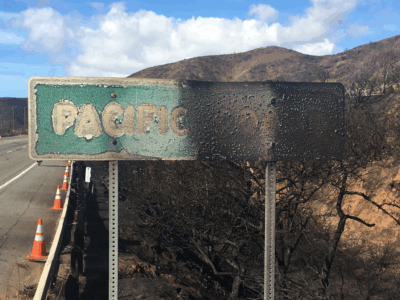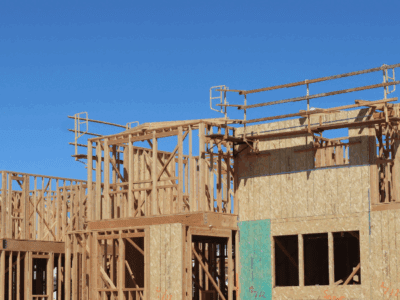Region: California
We Built This City On Urban Form
California’s CEQA reforms will require rethinking how we code our cities
I am one of the relatively few observers who is not convinced that the California Legislature’s recent CEQA reforms are some sort of major transformation. They are a positive step toward building more housing in this state, but the idea that they will unleash housing construction and affordability is a classic case of overpromising – …
Continue reading “We Built This City On Urban Form”
CONTINUE READINGWhy is EPA at War with Its Own Employees?
The Drain is a weekly roundup of environmental and climate news from Legal Planet.
While many of us prepared to celebrate Independence Day last week, a group of employees from the Environmental Protection Agency were bravely speaking out about what they see as their boss “recklessly undermining the EPA mission” of protecting human health and the environment. In a now-infamous letter sent to EPA Administrator Lee Zeldin, hundreds of …
Continue reading “Why is EPA at War with Its Own Employees?”
CONTINUE READINGFilling the gaps from CEQA reform
California has long leaned heavily on CEQA to cover gaps in other environmental laws. That will have to change when we reform CEQA.
California has enacted a major reform for CEQA, creating a substantial exemption for infill urban housing. I’ve written why this is, on balance, beneficial for housing and the environment. But I also want to highlight a pitfall as the state continues looking at future reforms for CEQA. California has long relied on CEQA as a …
Continue reading “Filling the gaps from CEQA reform”
CONTINUE READINGA Very Bad House Vehicle Pollution Bill
The Fuel Emissions Freedom Act may be a stunt, but it’s worth examining
It can be hard to keep track amid all the hair-raising developments in Congress and at the Supreme Court, but last week, a group of House Republicans led by Roger Williams of Texas introduced the Fuel Emissions Freedom Act, hot on the heels of the purported (illegal) termination of California’s vehicle emissions standard waiver. This freedom-to-pollute …
Continue reading “A Very Bad House Vehicle Pollution Bill”
CONTINUE READINGThoughts on AB 131
Overall a good bill, but the definition of natural and protected lands is inadequate
Governor Newsom is pushing for CEQA reform as part of approval of the state budget, and the result is two budget trailer bills, AB 130 and AB 131, that together provide some of the most significant changes to CEQA in many years. Overall, these are good bills. The changes are focused on facilitating development where …
Continue reading “Thoughts on AB 131”
CONTINUE READINGWhat Have We Learned About Rebuilding from Fire?
Woolsey Fire survivors reflect on the rebuilding process and what might help rebuild more resiliently after the January fires.
When I first met Nicole Fisher in 2019, her property in the Santa Monica Mountains was nothing but a driveway and a pile of cement. I was interviewing the art teacher for a radio story about her family’s plans to rebuild after the 2018 Woolsey Fire that destroyed her home and hundreds of others in …
Continue reading “What Have We Learned About Rebuilding from Fire?”
CONTINUE READINGThe “Big Beautiful Bill” is One Damn Dirty Deal
The Drain is a weekly roundup of environmental and climate news from Legal Planet.
My family is about to take a road trip. Out our window we will see beaches, lakes, and a whole lot of public land that would be eligible to be sold off to developers and corporations under the recent version of a budget bill that Republicans want to rush through this week. Welcome to The …
Continue reading “The “Big Beautiful Bill” is One Damn Dirty Deal”
CONTINUE READINGHere’s How the Palisades and Altadena Can Rebuild Better
In partnership with UCLA, the Blue Ribbon Commission on Climate Action and Fire-Safe Recovery has released its final recommendations.
The January 2025 Los Angeles fires were one of the most expensive climate disasters in our country’s history. They displaced tight-knit communities, took lives, shook our region to its core, and reminded us that as the climate continues to change, the risk of future disaster looms large. This recognition lead County Supervisor Lindsey Horvath to …
Continue reading “Here’s How the Palisades and Altadena Can Rebuild Better”
CONTINUE READINGA Path Forward for Vehicle Electrification?
It’s been a rough few months for vehicle electrification efforts in the United States. While Congress swaps proposals to eliminate federal electric vehicle purchase, manufacturing, and charging incentives in order to “pay for” massive tax cuts for the wealthy, President Trump last week signed a Congressional Review Act resolution that claims to eliminate California’s nation-leading …
Continue reading “A Path Forward for Vehicle Electrification?”
CONTINUE READINGCan Public Ownership Fix Our Electricity Woes? It’s Complicated
New UCLA report “Power Struggle: California’s Electric Utility Ownership Dilemma” by Sylvie Ashford, Mohit Chhabra, and Ruthie Lazenby
This post is co-authored by Sylvie Ashford and Mohit Chhabra. California’s investor-owned utilities (IOUs) are under intense scrutiny for causing deadly wildfires and charging some of the nation’s highest electricity rates. Adding to these challenges, IOUs are required to make significant clean energy and grid investments to achieve the state’s goal of a net zero …
Continue reading “Can Public Ownership Fix Our Electricity Woes? It’s Complicated”
CONTINUE READING








